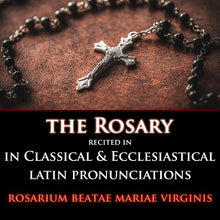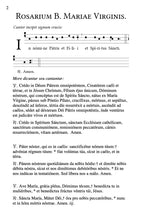Includes 12 audio files of the Rosary recited in Classical Pronunciation (CP) and in Ecclesiastical Pronunciation (EP) comprising 41 minutes of audio in Latin, as well as PDF with text recited.
The text is freely available as well at this link, and provided in the download for convenience. The recitation in this audiobook is performed directly from that PDF (that is, I have not added aditional prayers, but I have of course recited many of the same prayers according to the sequence in the text). The PDF also contains the musical notation for certain prayers, but I have not attempted to sing these parts, only recite them in a plain manner, since the scope of this audiobook is provide pronunciation examples only.
To use this download, you will have to download the file on a computer (PC or Mac), then decompress the .zip file if your computer does not do this automatically, and finally import the audio files into your preferred audio listening system (such as the Music application on macOS).
Also, this audiobook is available to my Senātōrēs tier patrons.
These recordings offer something unique to the listener: all the long and short vowels are correctly observed, in both pronunciations. I believe that phonemic vowel length is the most important and universal aspect of Latin pronunciation worth studying, since it gives us intuitive access to the literature, both prose and poety, which is based on this fundamental feature. I explain in detail in these videos:
Video Essay on Phonemic Vowel Length in Latin
While not common, there is no rule that prevents Ecclesiastical Pronunciation from being spoken with phonemic vowel length intact; indeed, I know some very fluent Latin speakers who consistently observe phonemic vowel length while using the Ecclesiastical Pronunciation. Classical Latin literature, as well as Mediaeval and Modern, may be recited in any pronunciation preferred by the speaker; these are merely conventions. Still, I do think learning to distinguish long and short vowels is the most important part of these conventions.
Moreover, there are some who prefer to recite their prayers in the Classical Pronunciation, so the CP version has been included as well. Enjoy!



